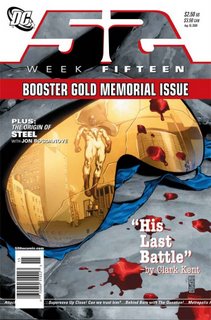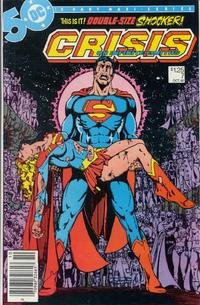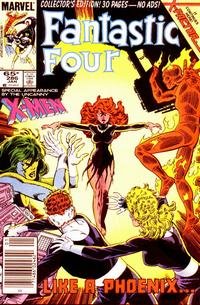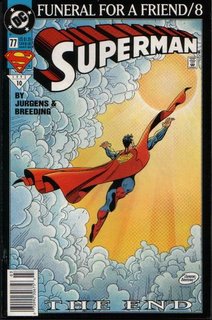 Okay, I'm going to try something different now: theory. God knows that as an English major I have the basic qualifications, but knowing how to begin, end or for that matter middle these kinds of pieces is tough. I'd go for the "introduction, three body paragraphs, conclusion" approach, only that brings back some ugly memories.
Okay, I'm going to try something different now: theory. God knows that as an English major I have the basic qualifications, but knowing how to begin, end or for that matter middle these kinds of pieces is tough. I'd go for the "introduction, three body paragraphs, conclusion" approach, only that brings back some ugly memories.Anyway, this one's inspired by things what have happened recently in the comics world. In last week's issue of 52, the superhero known as Booster Gold met his untimely end. He's the latest in a surprisingly long line of recent casualties who gained much of their fame in the 1987-1992 Giffen/DeMatteis run on JUSTICE LEAGUE, known as the JLI or "Bwah-ha-ha" era when the title became a kind of light superhero comedy, adored by many (myself included) and loathed by others. But that's for another column. Instead I'm thinking about superhero death in general, its impermanence, why this one doesn't sit too well with me, and why it maybe happens more than it should from an aesthetic standpoint.
First off, it's strongly rumored that Booster may not quite be dead. One of his gimmicks is that he can travel in time, and the mysterious character "Supernova" might end up being him from another timeline or something. I haven't been following very closely, or at all. So his specific case isn't that significant.

That said, DC's just been piling it on. The INFINITE CRISIS series just before this was chock full of "B-list" characters (another note for a future piece- why I hate the hierarchy) getting gorily snuffed to add drama, and it was kicked off by the untimely snuffing of Ted Kord, the Blue Beetle. So maybe my problem is that there've been too many of the damn things. The good thing about DC and Marvel's comics "universes" is that they're full of interesting and colorful characters. Everybody knows Superman, Batman, Spider-Man, the X-Men, etc., but the real fun of reading superhero comics comes when you encounter unusual figures like Bouncing Boy, Danny the Street, or the Starjammers, and realizing that all these obscure persons have their own rich history. The more "housecleaning" that gets done and the more heroes and villains consigned to oblivion, the less fantastic the universe is. Granted, it'd take many more deaths than those in IC to really diminish the variety in DC's stable, but you gotta be careful.
That said, there's another problem that comes when you kill off a superhero, which is that that character's fans don't like it. This happens in all serialized media to some degree or another, but when you're dealing with a continuity that has been in place since 1938, things get heated. Julius Schwartz, longtime DC editor, once remarked that "every character is somebody's favorite" (or words to that effect); Booster Gold isn't one-eighth as popular as Batman, but he has his fans, and so do Pantha, Wildebeest, and Namorita, to name a few recent casualties. And this is to say nothing of non-super supporting cast members like Sue Dibny and Dr. Moira MacTaggert, also departed and sorely missed. So, you piss off some readers, in exchange for adding dramatic import and nice weepy moments to a story. Finally, perhaps most obviously, killing off a character cuts off any future "in-continuity" stories for that character, and future writers will have to deal with an altered roster.

For the time being, anyway. Superhero comic book universes tend to be wild, magical places with all sorts of super-advanced technology and cosmos-altering spells. This gives writers and editors plenty of opportunities to bring back characters they like or need, though the explanations can range from the contrived (the person we saw die was a clone/robot/impostor) to the hugely elaborate (don't ask me to explain how Superman came back.) Occasionally it's done right. Usually the best ones are the simplest and most low-key; elemental hero Metamorpho came back into existence as a side-effect of a "gene bomb" launched by alien invaders that mucked with everyone else's superpowers; it took all of a page of the INVASION! crossover and was handled with a certain level of humor. Oliver Queen, the Green Arrow, just sort of came back. When a hero returns, there's exultation from their fanbase, accompanied by complaints from some corners that superhero deaths ought to be permanent and that these resurrections undermine the drama of the original deaths. (Such complaints rarely surface with regard to supervillain resurrections, as it's generally in-genre for bad guys to come back with the most trifling of explanations.)
I can see the logic of that, but I can't agree with it. The drama of a character's death comes from the way the moment itself is executed, not whether it "sticks", the same with any other dramatic moment in a story. THE LORD OF THE RINGS, THE CHRONICLES OF NARNIA, and BUFFY: THE VAMPIRE SLAYER all contain at least one instance of a hero coming back to life after being killed, which doesn't make the death scenes any less impressive. There's only a problem when the resurrection itself is poorly done or doesn't fit the logic of the story/setting. On the one hand, a character coming back to life can be a silly contrivance to force a happy ending, on the other, it's also a trope found in more than one religion and can be argued as a mythic element derived from the cycle of the seasons.
So, with a certain revolving-door system in place, are superhero deaths worth complaining about at all? The short answer is that this is the Internet and that continuity errors in FUTURAMA episodes are worth complaining about, but to be slightly less flip, there are some bad things about an overly bloody run of comics. There's almost always a waiting period between a character's death and resurrection, its length being that between the time of death and the time someone convinces the current editor that said character is worth reviving and has a decent pitch. You'll notice that editors and writers never say in the immediate aftermath of a death that said character is going to be back in X months; the illusion of change is important to maintain, and unless the return has already been plotted as part of the same story arc (as with the death and return of Superman), there's a minimum grace period which, to fans of the character, is annoying at best. In almost all cases, the people killing said characters aren't the ones who created them in the first place; they have a kind of temporary stewardship of a portion of the company's intellectual property, and they don't have the kind of aesthetic authority to insist that a death should be permanent. Insisting that any significant change introduced by a writer or editor can't be reversed would put good writers at the mercy of bad ones, and vice versa. Not that Dan Didio, Joe Quesada, Brian Bendis, Geoff Johns, or anyone else with a lot of creative influence is insisting on such authority, but it's something I hear a lot from the fanbase.
Got sidetracked there, sorry. Anyway, even if character death is impermanent, it does temporarily deprive fans of a favorite hero or ally, and given the degree to which we are encouraged to see ourselves in these larger than life spandex models, it can be particularly disheartening to see our chosen avatar bite the bullet. Which is not to say that superhero deaths shouldn't
 happen, but they could be rarer. Currently, it seems that every summer crossover event mandates at least one significant death, and usually more than that; these deaths, to me, seem to be a bit contrived. I'd prefer it if these deaths were limited to the organic, natural outcomes of a character's story; how we expect a figure to meet his/her end, be it heroically or otherwise. Booster Gold's final sacrifice was tainted a bit by the appearance that he was doing it solely to be remembered, Blue Beetle's by the fact that he didn't really accomplish anything- he didn't save the world or beat the bad guy, just left a nasty stain on the floor.
happen, but they could be rarer. Currently, it seems that every summer crossover event mandates at least one significant death, and usually more than that; these deaths, to me, seem to be a bit contrived. I'd prefer it if these deaths were limited to the organic, natural outcomes of a character's story; how we expect a figure to meet his/her end, be it heroically or otherwise. Booster Gold's final sacrifice was tainted a bit by the appearance that he was doing it solely to be remembered, Blue Beetle's by the fact that he didn't really accomplish anything- he didn't save the world or beat the bad guy, just left a nasty stain on the floor.Really, in fiction as a whole, a character who's been established, been given a rich history (of the sort all of DC and Marvel's characters inevitably accumulate over decades), had time to connect with the audience, shouldn't just be cannon fodder. Their death should say something about them. Which I don't think happens when their head is punched off at the start of a fight scene.
So, that's my essay. Cutting and insightful, or incoherent babble? You make the call!
1 comment:
Great essay, it's very insightful. I think you're dead on on everything. I get annoyed when people praise these events as getting rid of "baggage," not only does it homogenize the unverise, but it sort of takes the meaning out of a death when you realize it's more for economic spring cleaning than it is for actual artistic meaning, Infinite Crisis being a big example (Note that the Teen Titans, after IC, are bringing in new characters that are all sidekicks or derivatives).
I wholeheartedly agree that the death should be an organic, logical end to the character, rather than a sudden end of their storyline. Pantha's origin, for example, was never resolved, and Bushido had a whole lineage thing going on. I really don't think the people in charge are putting much thought into these deaths, in Johns' Wizard article on writing Infinite Crisis 4, the decision for who died boiled down to not being used in a long time, and how they can benefit another character's story, despite those marked characters' own histories.
Post a Comment